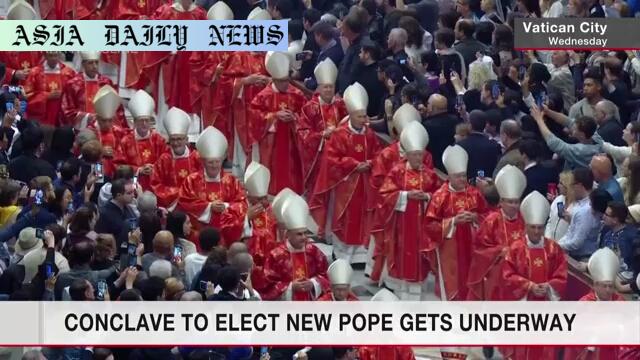Vatican conclave: On Wednesday, 133 cardinals of the Roman Catholic Church will start the process of electing a new spiritual leader.
133 cardinals will convene at the Vatican to elect a new pope.
The vote follows Pope Francis’ passing on April 21.
The conclave follows a rigorous process inside the Sistine Chapel.
Cardinals aim to select a leader reflecting global diversity.

Historic Vatican Conclave Begins
The historic Vatican conclave has officially commenced, with 133 cardinals from across the globe gathering in the Sistine Chapel to elect the next pope. This sacred procedure, steeped in centuries of tradition, becomes the focal point of the Catholic world after the passing of Pope Francis on April 21. On the first day of the conclave, the cardinals attend a special Mass in St. Peter’s Basilica, seeking divine guidance before embarking on the weighty task ahead.
As voting begins within the hallowed walls of the Sistine Chapel, the cardinals will be sequestered away from the outside world, preserving the sanctity and confidentiality of the process. The protocols are elaborate, allowing for one vote on the first day of the conclave, followed by two rounds of voting each morning and afternoon thereafter. The outcome hinges on securing a two-thirds majority, a process that underscores the gravity of this decision.
The Weight of Tradition and Global Diversity
The conclave signifies more than just the appointment of a new spiritual leader for over one billion Catholics worldwide. It reflects the challenges and opportunities facing the Church today, with attention increasingly drawn to diverse regions such as Asia, Africa, and Central and South America. The rise of cardinals from these demographics highlights the shifting dynamics within the Church and the potential for new paths of growth and understanding.
Amid speculation, many faithful followers have gathered in St. Peter’s Square, waiting with hope and anticipation. The symbolism of black or white smoke from the Sistine Chapel’s chimney marks the progress (or lack thereof) of the election. The presence of pilgrims from diverse backgrounds, eager to witness history, underscores the universal appeal and relevance of this moment.
A Rare and Profound Decision
For new generations, this conclave holds added significance as the legacy of Pope Francis comes to a close. The mention of a possible first Asian pope, as desired by some attendees, highlights the evolving face of Catholicism. The election of a new pope in the first round is a rare occurrence, emphasizing how deliberate and deeply considered the decision will be.
Speculation about potential candidates, including close aides to the late pope, adds intrigue to the process. Yet, the primary focus remains on the qualities needed to lead the Church during this transformative period. Will the new pontiff bring innovative changes or preserve longstanding traditions? This is a question that not only cardinals but many faithful Catholics around the world are contemplating.
The Conclave’s Broader Significance
Ultimately, the conclave is a solemn event that resonates far beyond the Vatican walls. It is steeped in ritual, with profound significance for the faithful. It highlights the intricate balance between faith, leadership, and governance within the Roman Catholic Church. The decision made in these sacred chambers over the next few days will influence the Church’s direction globally, shaping its message, outreach, and impact for decades to come.
As the conclave unfolds, the world watches with bated breath. It is not only a question of religious leadership but also a matter of cultural inclusivity and global representation. The eventual choice will mark the beginning of a new chapter for the Roman Catholic Church, one that will be closely scrutinized and celebrated by its global followers.



Commentary
The Profound Impact of the Vatican Conclave
The Vatican conclave is a momentous event not only for Catholics but for the world at large. It embodies centuries of tradition, spirituality, and faith. For 133 cardinals, the choice of a new pope is not just a political decision; it is a testament to their commitment to upholding the Church’s mission. The conclave’s profound secrecy, paired with its historical significance, creates an air of sacred mystery that captivates global attention.
The Challenges of Modern Leadership
In today’s world, the role of the pope extends beyond spiritual leadership. A new pope must navigate issues ranging from globalization and interfaith dialogue to social and economic justice. The diversity reflected in this conclave underscores the growing need for a leader who can bridge cultural and geographical divides. In many ways, the election is a mirror of the evolving Catholic Church—a reflection of its past, present, and aspirations for the future.
The Role of Pilgrims and Observers
The enthusiasm of pilgrims converging in St. Peter’s Square is a powerful reminder of how much this decision matters to ordinary people. Their prayers, hopes, and presence reinforce the Church’s universal importance. Whether it’s the woman hoping for the first Asian pope or wide-eyed tourists marveling at the rituals, the conclave is inclusive despite its exclusivity in decision-making.
Looking Forward
As the cardinals deliberate, the anticipation grows. The conclave invites not only reflection on Catholic tradition but also analysis of how faith can adapt to contemporary challenges. It remains to be seen whether this new chapter for the Church will usher in unity, innovation, and a more inclusive vision for the future. Whatever the outcome, the Vatican conclave serves as a poignant reminder of the enduring power of faith and leadership.